Leadership Report: Scientific Management at Domino's Pizza
VerifiedAdded on 2020/01/28
|9
|2011
|3935
Report
AI Summary
This report provides a comprehensive analysis of leadership principles and their practical application within Domino's Pizza. It begins by introducing the concept of scientific management, highlighting the contributions of Taylor and Fayol, and then delves into the specific cross-functional teams within Domino's. The report examines the leadership style employed, particularly the use of participative leadership, and how it aligns with Fayol's 14 principles of management. It further explores the application of scientific management principles within the work team, focusing on discipline, equity, and team spirit. The report then analyzes the effect of scientific management on employee motivation, referencing Maslow's hierarchy of needs and its limitations. The conclusion emphasizes the effectiveness of scientific management in achieving organizational goals and the importance of employee participation. Finally, the report offers recommendations for leaders at Domino's, including encouraging employee involvement in decision-making and addressing employee needs for enhanced motivation.

LEADERSHIP IN
ACTION
ACTION
Paraphrase This Document
Need a fresh take? Get an instant paraphrase of this document with our AI Paraphraser
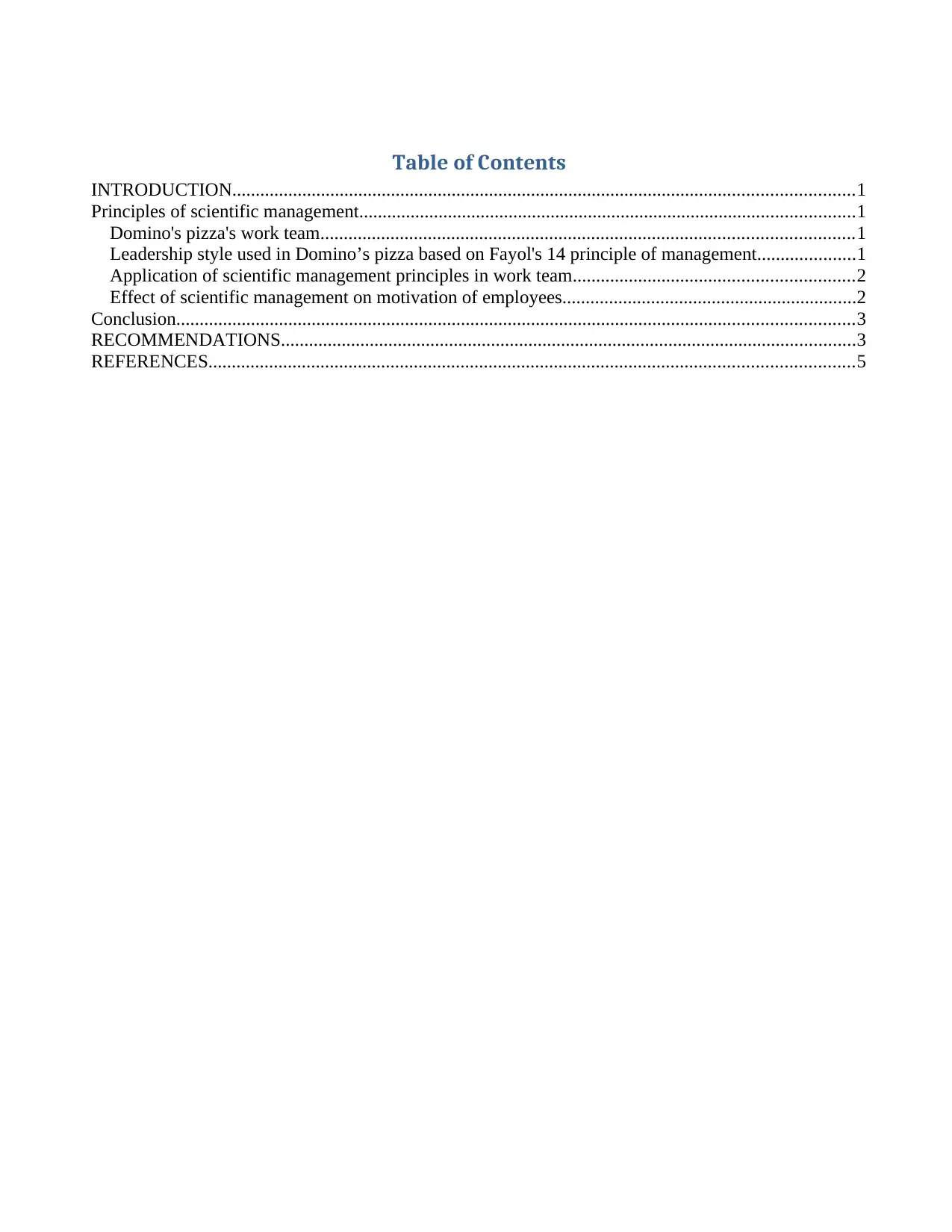
Table of Contents
INTRODUCTION.....................................................................................................................................1
Principles of scientific management..........................................................................................................1
Domino's pizza's work team..................................................................................................................1
Leadership style used in Domino’s pizza based on Fayol's 14 principle of management.....................1
Application of scientific management principles in work team............................................................2
Effect of scientific management on motivation of employees...............................................................2
Conclusion.................................................................................................................................................3
RECOMMENDATIONS...........................................................................................................................3
REFERENCES..........................................................................................................................................5
INTRODUCTION.....................................................................................................................................1
Principles of scientific management..........................................................................................................1
Domino's pizza's work team..................................................................................................................1
Leadership style used in Domino’s pizza based on Fayol's 14 principle of management.....................1
Application of scientific management principles in work team............................................................2
Effect of scientific management on motivation of employees...............................................................2
Conclusion.................................................................................................................................................3
RECOMMENDATIONS...........................................................................................................................3
REFERENCES..........................................................................................................................................5
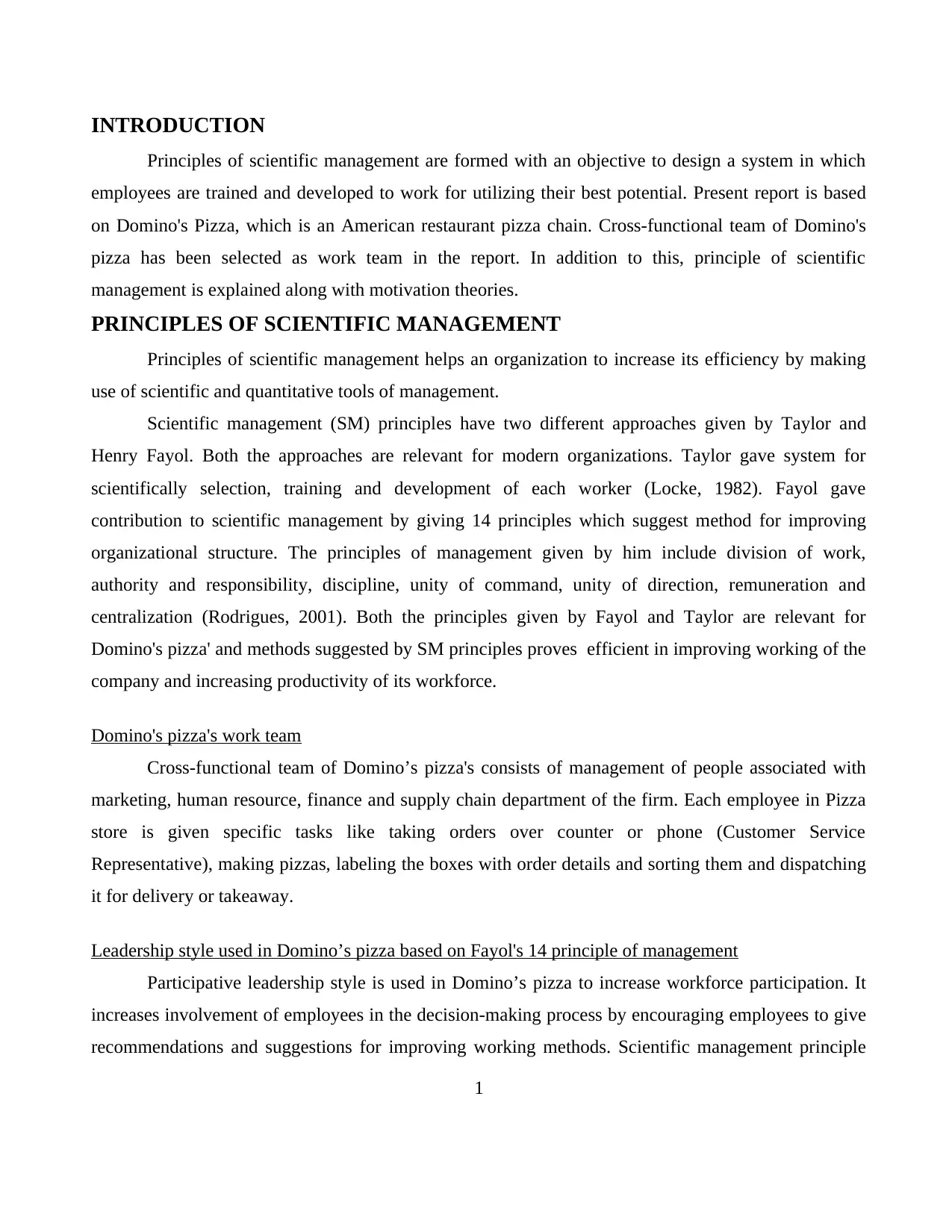
INTRODUCTION
Principles of scientific management are formed with an objective to design a system in which
employees are trained and developed to work for utilizing their best potential. Present report is based
on Domino's Pizza, which is an American restaurant pizza chain. Cross-functional team of Domino's
pizza has been selected as work team in the report. In addition to this, principle of scientific
management is explained along with motivation theories.
PRINCIPLES OF SCIENTIFIC MANAGEMENT
Principles of scientific management helps an organization to increase its efficiency by making
use of scientific and quantitative tools of management.
Scientific management (SM) principles have two different approaches given by Taylor and
Henry Fayol. Both the approaches are relevant for modern organizations. Taylor gave system for
scientifically selection, training and development of each worker (Locke, 1982). Fayol gave
contribution to scientific management by giving 14 principles which suggest method for improving
organizational structure. The principles of management given by him include division of work,
authority and responsibility, discipline, unity of command, unity of direction, remuneration and
centralization (Rodrigues, 2001). Both the principles given by Fayol and Taylor are relevant for
Domino's pizza' and methods suggested by SM principles proves efficient in improving working of the
company and increasing productivity of its workforce.
Domino's pizza's work team
Cross-functional team of Domino’s pizza's consists of management of people associated with
marketing, human resource, finance and supply chain department of the firm. Each employee in Pizza
store is given specific tasks like taking orders over counter or phone (Customer Service
Representative), making pizzas, labeling the boxes with order details and sorting them and dispatching
it for delivery or takeaway.
Leadership style used in Domino’s pizza based on Fayol's 14 principle of management
Participative leadership style is used in Domino’s pizza to increase workforce participation. It
increases involvement of employees in the decision-making process by encouraging employees to give
recommendations and suggestions for improving working methods. Scientific management principle
1
Principles of scientific management are formed with an objective to design a system in which
employees are trained and developed to work for utilizing their best potential. Present report is based
on Domino's Pizza, which is an American restaurant pizza chain. Cross-functional team of Domino's
pizza has been selected as work team in the report. In addition to this, principle of scientific
management is explained along with motivation theories.
PRINCIPLES OF SCIENTIFIC MANAGEMENT
Principles of scientific management helps an organization to increase its efficiency by making
use of scientific and quantitative tools of management.
Scientific management (SM) principles have two different approaches given by Taylor and
Henry Fayol. Both the approaches are relevant for modern organizations. Taylor gave system for
scientifically selection, training and development of each worker (Locke, 1982). Fayol gave
contribution to scientific management by giving 14 principles which suggest method for improving
organizational structure. The principles of management given by him include division of work,
authority and responsibility, discipline, unity of command, unity of direction, remuneration and
centralization (Rodrigues, 2001). Both the principles given by Fayol and Taylor are relevant for
Domino's pizza' and methods suggested by SM principles proves efficient in improving working of the
company and increasing productivity of its workforce.
Domino's pizza's work team
Cross-functional team of Domino’s pizza's consists of management of people associated with
marketing, human resource, finance and supply chain department of the firm. Each employee in Pizza
store is given specific tasks like taking orders over counter or phone (Customer Service
Representative), making pizzas, labeling the boxes with order details and sorting them and dispatching
it for delivery or takeaway.
Leadership style used in Domino’s pizza based on Fayol's 14 principle of management
Participative leadership style is used in Domino’s pizza to increase workforce participation. It
increases involvement of employees in the decision-making process by encouraging employees to give
recommendations and suggestions for improving working methods. Scientific management principle
1
⊘ This is a preview!⊘
Do you want full access?
Subscribe today to unlock all pages.

Trusted by 1+ million students worldwide
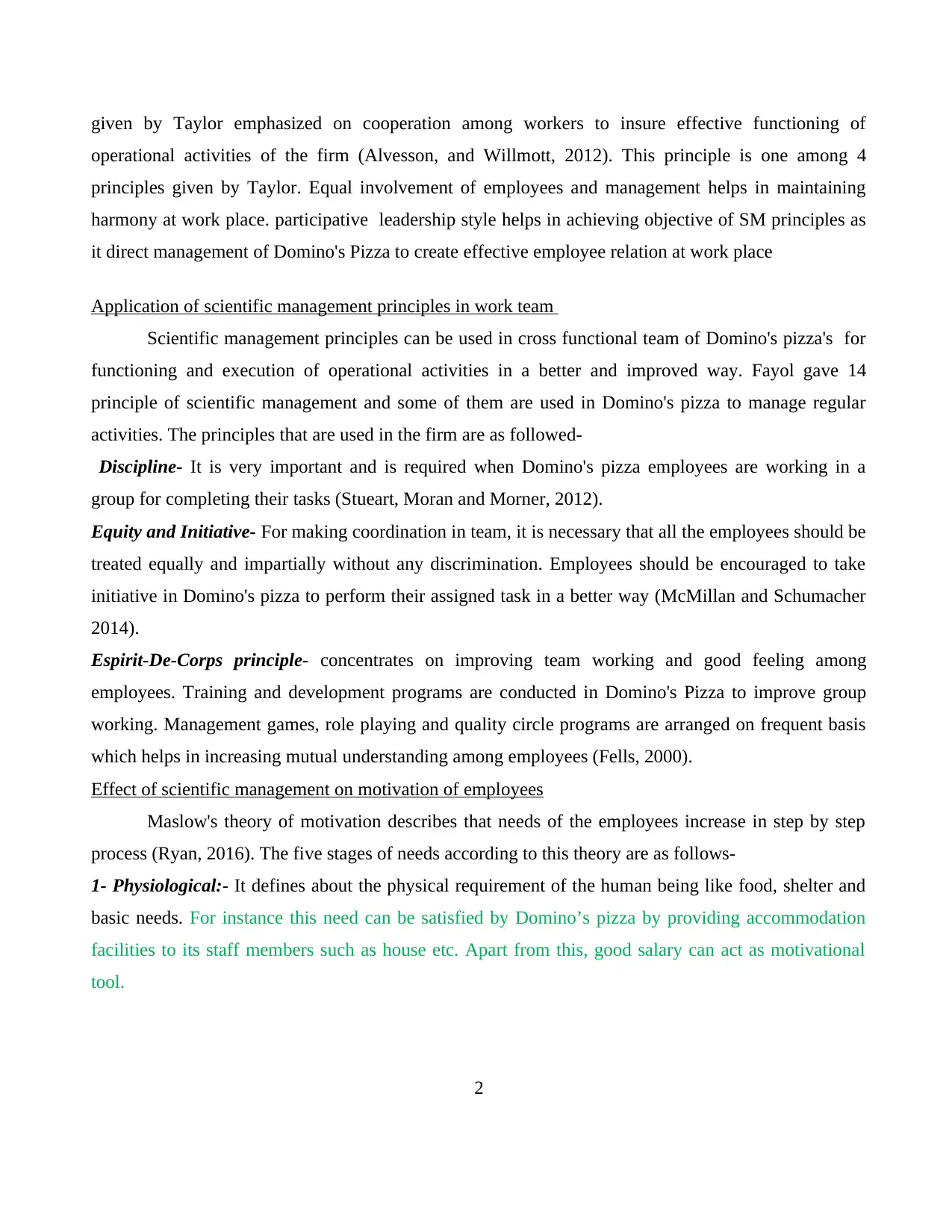
given by Taylor emphasized on cooperation among workers to insure effective functioning of
operational activities of the firm (Alvesson, and Willmott, 2012). This principle is one among 4
principles given by Taylor. Equal involvement of employees and management helps in maintaining
harmony at work place. participative leadership style helps in achieving objective of SM principles as
it direct management of Domino's Pizza to create effective employee relation at work place
Application of scientific management principles in work team
Scientific management principles can be used in cross functional team of Domino's pizza's for
functioning and execution of operational activities in a better and improved way. Fayol gave 14
principle of scientific management and some of them are used in Domino's pizza to manage regular
activities. The principles that are used in the firm are as followed-
Discipline- It is very important and is required when Domino's pizza employees are working in a
group for completing their tasks (Stueart, Moran and Morner, 2012).
Equity and Initiative- For making coordination in team, it is necessary that all the employees should be
treated equally and impartially without any discrimination. Employees should be encouraged to take
initiative in Domino's pizza to perform their assigned task in a better way (McMillan and Schumacher
2014).
Espirit-De-Corps principle- concentrates on improving team working and good feeling among
employees. Training and development programs are conducted in Domino's Pizza to improve group
working. Management games, role playing and quality circle programs are arranged on frequent basis
which helps in increasing mutual understanding among employees (Fells, 2000).
Effect of scientific management on motivation of employees
Maslow's theory of motivation describes that needs of the employees increase in step by step
process (Ryan, 2016). The five stages of needs according to this theory are as follows-
1- Physiological:- It defines about the physical requirement of the human being like food, shelter and
basic needs. For instance this need can be satisfied by Domino’s pizza by providing accommodation
facilities to its staff members such as house etc. Apart from this, good salary can act as motivational
tool.
2
operational activities of the firm (Alvesson, and Willmott, 2012). This principle is one among 4
principles given by Taylor. Equal involvement of employees and management helps in maintaining
harmony at work place. participative leadership style helps in achieving objective of SM principles as
it direct management of Domino's Pizza to create effective employee relation at work place
Application of scientific management principles in work team
Scientific management principles can be used in cross functional team of Domino's pizza's for
functioning and execution of operational activities in a better and improved way. Fayol gave 14
principle of scientific management and some of them are used in Domino's pizza to manage regular
activities. The principles that are used in the firm are as followed-
Discipline- It is very important and is required when Domino's pizza employees are working in a
group for completing their tasks (Stueart, Moran and Morner, 2012).
Equity and Initiative- For making coordination in team, it is necessary that all the employees should be
treated equally and impartially without any discrimination. Employees should be encouraged to take
initiative in Domino's pizza to perform their assigned task in a better way (McMillan and Schumacher
2014).
Espirit-De-Corps principle- concentrates on improving team working and good feeling among
employees. Training and development programs are conducted in Domino's Pizza to improve group
working. Management games, role playing and quality circle programs are arranged on frequent basis
which helps in increasing mutual understanding among employees (Fells, 2000).
Effect of scientific management on motivation of employees
Maslow's theory of motivation describes that needs of the employees increase in step by step
process (Ryan, 2016). The five stages of needs according to this theory are as follows-
1- Physiological:- It defines about the physical requirement of the human being like food, shelter and
basic needs. For instance this need can be satisfied by Domino’s pizza by providing accommodation
facilities to its staff members such as house etc. Apart from this, good salary can act as motivational
tool.
2
Paraphrase This Document
Need a fresh take? Get an instant paraphrase of this document with our AI Paraphraser
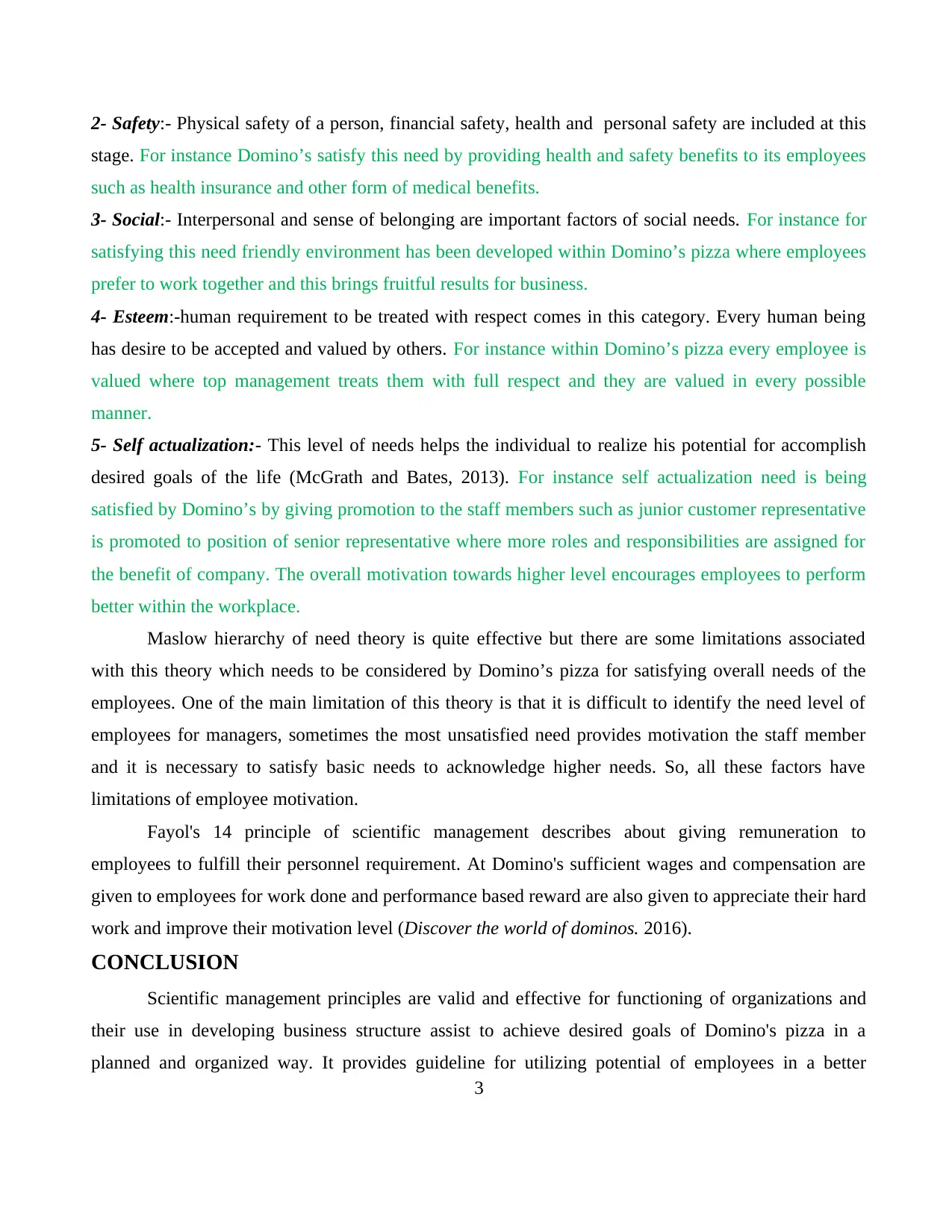
2- Safety:- Physical safety of a person, financial safety, health and personal safety are included at this
stage. For instance Domino’s satisfy this need by providing health and safety benefits to its employees
such as health insurance and other form of medical benefits.
3- Social:- Interpersonal and sense of belonging are important factors of social needs. For instance for
satisfying this need friendly environment has been developed within Domino’s pizza where employees
prefer to work together and this brings fruitful results for business.
4- Esteem:-human requirement to be treated with respect comes in this category. Every human being
has desire to be accepted and valued by others. For instance within Domino’s pizza every employee is
valued where top management treats them with full respect and they are valued in every possible
manner.
5- Self actualization:- This level of needs helps the individual to realize his potential for accomplish
desired goals of the life (McGrath and Bates, 2013). For instance self actualization need is being
satisfied by Domino’s by giving promotion to the staff members such as junior customer representative
is promoted to position of senior representative where more roles and responsibilities are assigned for
the benefit of company. The overall motivation towards higher level encourages employees to perform
better within the workplace.
Maslow hierarchy of need theory is quite effective but there are some limitations associated
with this theory which needs to be considered by Domino’s pizza for satisfying overall needs of the
employees. One of the main limitation of this theory is that it is difficult to identify the need level of
employees for managers, sometimes the most unsatisfied need provides motivation the staff member
and it is necessary to satisfy basic needs to acknowledge higher needs. So, all these factors have
limitations of employee motivation.
Fayol's 14 principle of scientific management describes about giving remuneration to
employees to fulfill their personnel requirement. At Domino's sufficient wages and compensation are
given to employees for work done and performance based reward are also given to appreciate their hard
work and improve their motivation level (Discover the world of dominos. 2016).
CONCLUSION
Scientific management principles are valid and effective for functioning of organizations and
their use in developing business structure assist to achieve desired goals of Domino's pizza in a
planned and organized way. It provides guideline for utilizing potential of employees in a better
3
stage. For instance Domino’s satisfy this need by providing health and safety benefits to its employees
such as health insurance and other form of medical benefits.
3- Social:- Interpersonal and sense of belonging are important factors of social needs. For instance for
satisfying this need friendly environment has been developed within Domino’s pizza where employees
prefer to work together and this brings fruitful results for business.
4- Esteem:-human requirement to be treated with respect comes in this category. Every human being
has desire to be accepted and valued by others. For instance within Domino’s pizza every employee is
valued where top management treats them with full respect and they are valued in every possible
manner.
5- Self actualization:- This level of needs helps the individual to realize his potential for accomplish
desired goals of the life (McGrath and Bates, 2013). For instance self actualization need is being
satisfied by Domino’s by giving promotion to the staff members such as junior customer representative
is promoted to position of senior representative where more roles and responsibilities are assigned for
the benefit of company. The overall motivation towards higher level encourages employees to perform
better within the workplace.
Maslow hierarchy of need theory is quite effective but there are some limitations associated
with this theory which needs to be considered by Domino’s pizza for satisfying overall needs of the
employees. One of the main limitation of this theory is that it is difficult to identify the need level of
employees for managers, sometimes the most unsatisfied need provides motivation the staff member
and it is necessary to satisfy basic needs to acknowledge higher needs. So, all these factors have
limitations of employee motivation.
Fayol's 14 principle of scientific management describes about giving remuneration to
employees to fulfill their personnel requirement. At Domino's sufficient wages and compensation are
given to employees for work done and performance based reward are also given to appreciate their hard
work and improve their motivation level (Discover the world of dominos. 2016).
CONCLUSION
Scientific management principles are valid and effective for functioning of organizations and
their use in developing business structure assist to achieve desired goals of Domino's pizza in a
planned and organized way. It provides guideline for utilizing potential of employees in a better
3
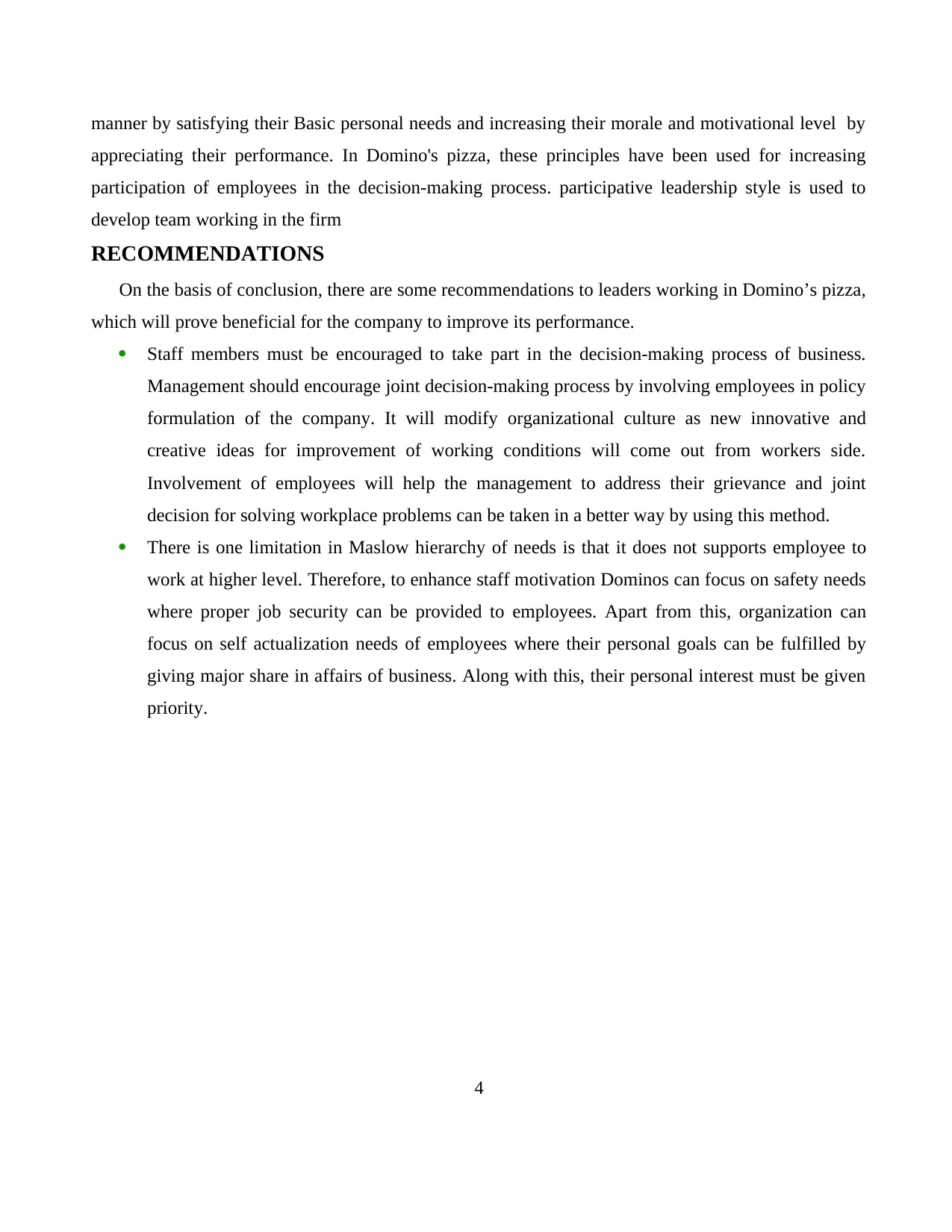
manner by satisfying their Basic personal needs and increasing their morale and motivational level by
appreciating their performance. In Domino's pizza, these principles have been used for increasing
participation of employees in the decision-making process. participative leadership style is used to
develop team working in the firm
RECOMMENDATIONS
On the basis of conclusion, there are some recommendations to leaders working in Domino’s pizza,
which will prove beneficial for the company to improve its performance.
Staff members must be encouraged to take part in the decision-making process of business.
Management should encourage joint decision-making process by involving employees in policy
formulation of the company. It will modify organizational culture as new innovative and
creative ideas for improvement of working conditions will come out from workers side.
Involvement of employees will help the management to address their grievance and joint
decision for solving workplace problems can be taken in a better way by using this method.
There is one limitation in Maslow hierarchy of needs is that it does not supports employee to
work at higher level. Therefore, to enhance staff motivation Dominos can focus on safety needs
where proper job security can be provided to employees. Apart from this, organization can
focus on self actualization needs of employees where their personal goals can be fulfilled by
giving major share in affairs of business. Along with this, their personal interest must be given
priority.
4
appreciating their performance. In Domino's pizza, these principles have been used for increasing
participation of employees in the decision-making process. participative leadership style is used to
develop team working in the firm
RECOMMENDATIONS
On the basis of conclusion, there are some recommendations to leaders working in Domino’s pizza,
which will prove beneficial for the company to improve its performance.
Staff members must be encouraged to take part in the decision-making process of business.
Management should encourage joint decision-making process by involving employees in policy
formulation of the company. It will modify organizational culture as new innovative and
creative ideas for improvement of working conditions will come out from workers side.
Involvement of employees will help the management to address their grievance and joint
decision for solving workplace problems can be taken in a better way by using this method.
There is one limitation in Maslow hierarchy of needs is that it does not supports employee to
work at higher level. Therefore, to enhance staff motivation Dominos can focus on safety needs
where proper job security can be provided to employees. Apart from this, organization can
focus on self actualization needs of employees where their personal goals can be fulfilled by
giving major share in affairs of business. Along with this, their personal interest must be given
priority.
4
⊘ This is a preview!⊘
Do you want full access?
Subscribe today to unlock all pages.

Trusted by 1+ million students worldwide

5
Paraphrase This Document
Need a fresh take? Get an instant paraphrase of this document with our AI Paraphraser
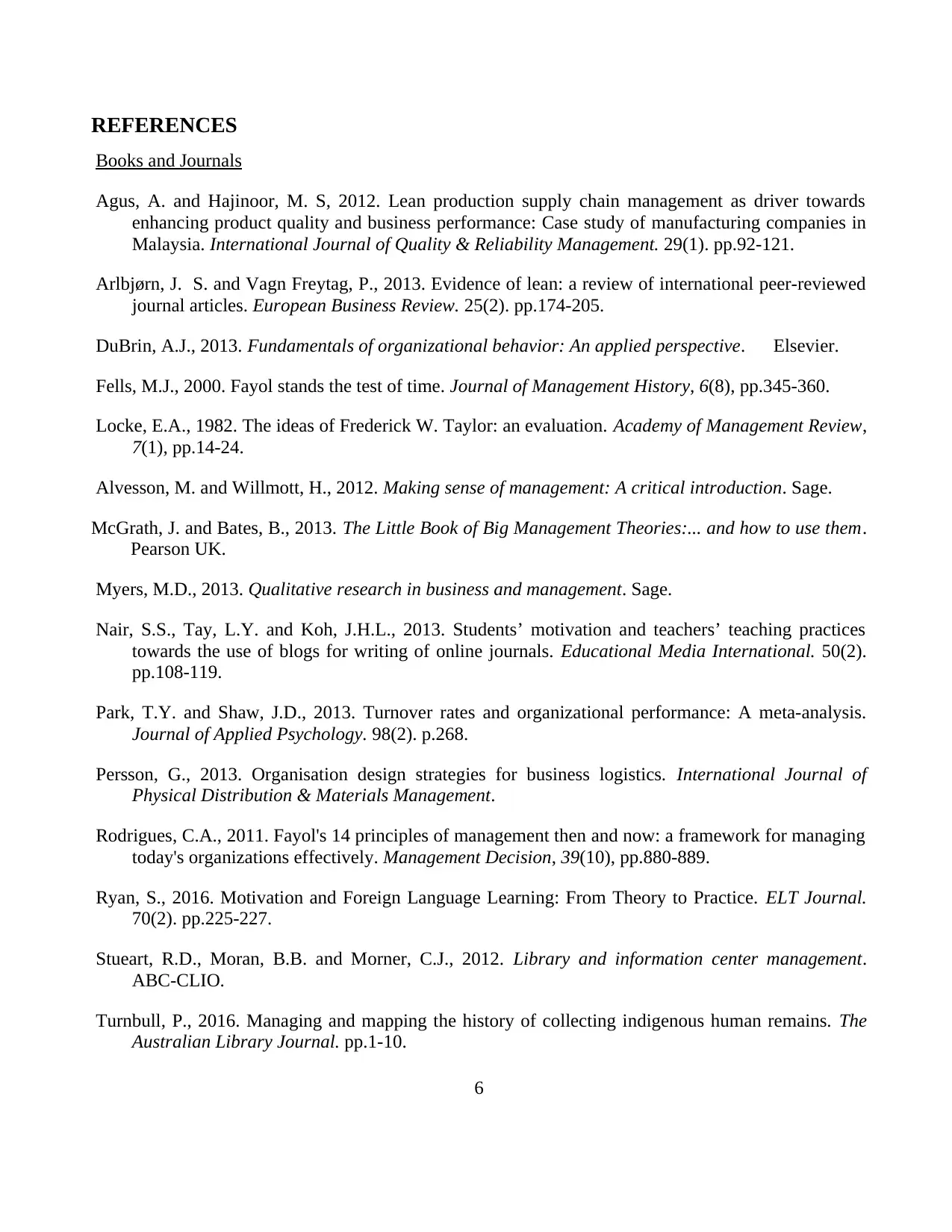
REFERENCES
Books and Journals
Agus, A. and Hajinoor, M. S, 2012. Lean production supply chain management as driver towards
enhancing product quality and business performance: Case study of manufacturing companies in
Malaysia. International Journal of Quality & Reliability Management. 29(1). pp.92-121.
Arlbjørn, J. S. and Vagn Freytag, P., 2013. Evidence of lean: a review of international peer-reviewed
journal articles. European Business Review. 25(2). pp.174-205.
DuBrin, A.J., 2013. Fundamentals of organizational behavior: An applied perspective. Elsevier.
Fells, M.J., 2000. Fayol stands the test of time. Journal of Management History, 6(8), pp.345-360.
Locke, E.A., 1982. The ideas of Frederick W. Taylor: an evaluation. Academy of Management Review,
7(1), pp.14-24.
Alvesson, M. and Willmott, H., 2012. Making sense of management: A critical introduction. Sage.
McGrath, J. and Bates, B., 2013. The Little Book of Big Management Theories:... and how to use them.
Pearson UK.
Myers, M.D., 2013. Qualitative research in business and management. Sage.
Nair, S.S., Tay, L.Y. and Koh, J.H.L., 2013. Students’ motivation and teachers’ teaching practices
towards the use of blogs for writing of online journals. Educational Media International. 50(2).
pp.108-119.
Park, T.Y. and Shaw, J.D., 2013. Turnover rates and organizational performance: A meta-analysis.
Journal of Applied Psychology. 98(2). p.268.
Persson, G., 2013. Organisation design strategies for business logistics. International Journal of
Physical Distribution & Materials Management.
Rodrigues, C.A., 2011. Fayol's 14 principles of management then and now: a framework for managing
today's organizations effectively. Management Decision, 39(10), pp.880-889.
Ryan, S., 2016. Motivation and Foreign Language Learning: From Theory to Practice. ELT Journal.
70(2). pp.225-227.
Stueart, R.D., Moran, B.B. and Morner, C.J., 2012. Library and information center management.
ABC-CLIO.
Turnbull, P., 2016. Managing and mapping the history of collecting indigenous human remains. The
Australian Library Journal. pp.1-10.
6
Books and Journals
Agus, A. and Hajinoor, M. S, 2012. Lean production supply chain management as driver towards
enhancing product quality and business performance: Case study of manufacturing companies in
Malaysia. International Journal of Quality & Reliability Management. 29(1). pp.92-121.
Arlbjørn, J. S. and Vagn Freytag, P., 2013. Evidence of lean: a review of international peer-reviewed
journal articles. European Business Review. 25(2). pp.174-205.
DuBrin, A.J., 2013. Fundamentals of organizational behavior: An applied perspective. Elsevier.
Fells, M.J., 2000. Fayol stands the test of time. Journal of Management History, 6(8), pp.345-360.
Locke, E.A., 1982. The ideas of Frederick W. Taylor: an evaluation. Academy of Management Review,
7(1), pp.14-24.
Alvesson, M. and Willmott, H., 2012. Making sense of management: A critical introduction. Sage.
McGrath, J. and Bates, B., 2013. The Little Book of Big Management Theories:... and how to use them.
Pearson UK.
Myers, M.D., 2013. Qualitative research in business and management. Sage.
Nair, S.S., Tay, L.Y. and Koh, J.H.L., 2013. Students’ motivation and teachers’ teaching practices
towards the use of blogs for writing of online journals. Educational Media International. 50(2).
pp.108-119.
Park, T.Y. and Shaw, J.D., 2013. Turnover rates and organizational performance: A meta-analysis.
Journal of Applied Psychology. 98(2). p.268.
Persson, G., 2013. Organisation design strategies for business logistics. International Journal of
Physical Distribution & Materials Management.
Rodrigues, C.A., 2011. Fayol's 14 principles of management then and now: a framework for managing
today's organizations effectively. Management Decision, 39(10), pp.880-889.
Ryan, S., 2016. Motivation and Foreign Language Learning: From Theory to Practice. ELT Journal.
70(2). pp.225-227.
Stueart, R.D., Moran, B.B. and Morner, C.J., 2012. Library and information center management.
ABC-CLIO.
Turnbull, P., 2016. Managing and mapping the history of collecting indigenous human remains. The
Australian Library Journal. pp.1-10.
6
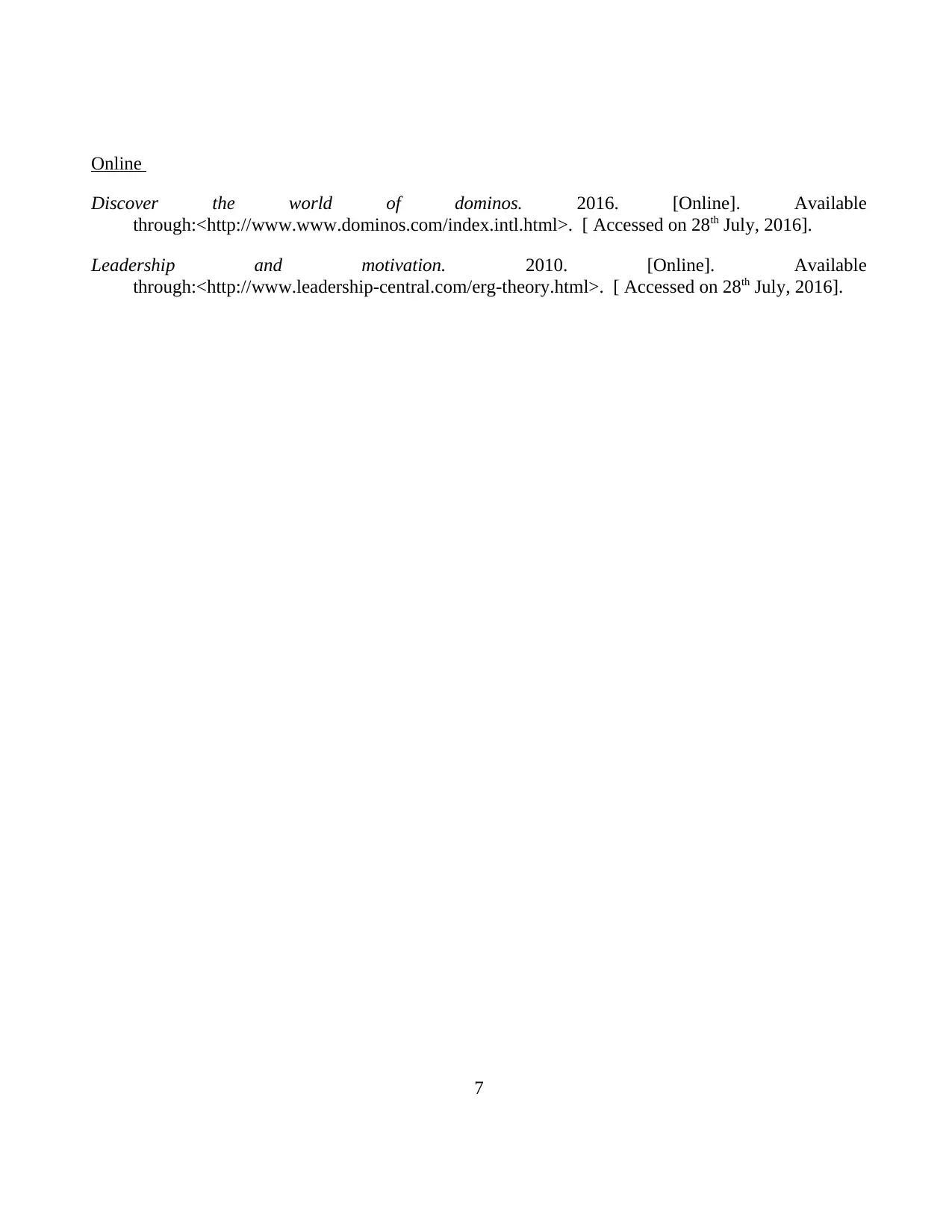
Online
Discover the world of dominos. 2016. [Online]. Available
through:<http://www.www.dominos.com/index.intl.html>. [ Accessed on 28th July, 2016].
Leadership and motivation. 2010. [Online]. Available
through:<http://www.leadership-central.com/erg-theory.html>. [ Accessed on 28th July, 2016].
7
Discover the world of dominos. 2016. [Online]. Available
through:<http://www.www.dominos.com/index.intl.html>. [ Accessed on 28th July, 2016].
Leadership and motivation. 2010. [Online]. Available
through:<http://www.leadership-central.com/erg-theory.html>. [ Accessed on 28th July, 2016].
7
⊘ This is a preview!⊘
Do you want full access?
Subscribe today to unlock all pages.

Trusted by 1+ million students worldwide
1 out of 9
Related Documents
Your All-in-One AI-Powered Toolkit for Academic Success.
+13062052269
info@desklib.com
Available 24*7 on WhatsApp / Email
![[object Object]](/_next/static/media/star-bottom.7253800d.svg)
Unlock your academic potential
Copyright © 2020–2026 A2Z Services. All Rights Reserved. Developed and managed by ZUCOL.




